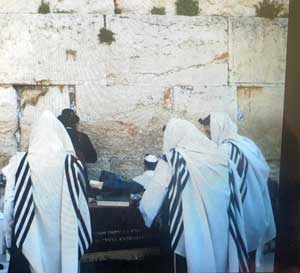God’s Calendar
The Fall Appointed Days: Part 1
Then the Lord spoke to Moses, saying, “Speak to the children of Israel, saying: ‘In the seventh month…” Leviticus 23:23-24a
According to God’s calendar (Hebrew), the fall holidays are in the seventh month, and usually according to the Gregorian calendar in either September or October. The fall holidays in 2021 are:
- The Memorial Blowing [Day of Trumpets, today’s Rosh Hashanah, Jewish New Year] (September 7-8)
- The Day of Atonement [Yom Kippur] (September 16)
- The Feast of Tabernacles [Sukkot] (September 22-28)
The fall holidays point to the present and future ministry of Yeshua.
We are nearing the end of the month of Elul, the last month on the Jewish calendar that ends on the eve of Rosh Hashanah, Jewish New Year’s Eve (Leviticus 23:23-24).
Teshuvah
Every year, in the month of Elul, usually in August, Jews enter the season of Teshuva. Teshuva or repentance is returning to Father God (Elohim.) This is a word that indicates a turning back (shuv) to God. This word appears in Genesis 3:19 when the Lord tells Adam, “and to dust you will return (tashuv).”
The season of Teshuvah begins on the first day of Elul and ends 40 days later on the 10th of Tishri at sundown – the end of Yom Kippur – the Day of Atonement.
Teshuva indicates both a turning away from evil and a turning toward what is good, God’s ways. In turning toward God, one dedicates his entire soul to serving Him. Traditionally it is considered to be a time of introspection, when Jews are taking stock of their lives, evaluating their actions, and contemplating what they have accomplished during the previous year, both materially and spiritually.

Each morning for the 40 days of Teshuvah the shofar is blown at the Morning Prayer service to call everyone to repent and return to God. Psalm 27 is recited after each morning and evening service. “The Lord is my light and my salvation; whom shall I fear?”
The following month in the Hebrew calendar is Tishrei. The first day of Tishrei is Yom Teruah (Day of Trumpets, Leviticus 23:24.) Rosh Hashanah is also called Yom Hazikaron – Day of Remembrance and Awakening. “Awake you sleepers from your sleep! Raise yourselves you slumberers! Examine your deeds and return unto God in repentance. Abandon your evil ways, your unworthy scheming – every one of you.” (from The Gates of Repentance, a Rosh Hashanah prayer book that cites Maimonides’s “call to awakening”.)
There are ten days from Yom Teruah to Yom Kippur. These 10 days are traditionally referred to as the “10 Days of Awe.” These are the most intense days of praying and repenting, leading up to the climax of return, which is Yom Kippur – Day of Atonement. This was a time traditionally believed that Father God would draw His ear close for the prayers of the penitent.
Isaiah 55:6 “Seek the LORD while he may be found; call upon him while he is near;”
In biblical times, the HaCohen HaGadol (High Priest) would enter into the Holy of Holies in the Holy Temple, only once a year, on Yom Kippur. He would sprinkle blood on the Mercy Seat of the Ark of the Covenant, as an atonement for the entire nation of Israel.
The 10 Days of Awe

According to Jewish tradition, on Yom Teruah (Rosh HaShana,) God’s Book of Life and Death is opened in heaven and remains open for the Ten Days of Awe. They begin with the Day of Judgment. During these ten days of Awe, Jews are prepared to stand before God for judgment, as the book is opened. The names of those who have lived sinless and righteous lives during the past year are inscribed in the Book of Life. It is also believed that the gates of heaven are opened on Rosh Hashanah and closed on Yom Kippur. “Open to me the gates of righteousness. I shall enter through them. I shall give thanks to the Lord. This is the gate of the Lord. The righteous will enter through it.” (Psalm 118:19-20, Isaiah 26:2.)
Jews believe that God makes His judgment at this time. However, once Yom Kippur ends at sunset, the book is closed for another year. It was during Yom Kippur, that men would traditionally tear their outer coats as an outward sign of repentance and mourning, and place ashes on their heads. Some would beat their chests violently in a show of repentance and pain, hoping that God would hear their cries of repentance, forgive their sins and inscribe their names in the Book of Life. A common greeting in Israel in those ten days of awe, and especially on Yom Kippur is: “May your name be inscribed in the Book of Life.”
Although this tradition is not biblical, the truth is that God does have a Book of Life. While in the wilderness journey, Israel sinned greatly by constructing and worshiping a golden calf. Moses fulfilled his role as a type and shadow of Messiah Yeshua and interceded for the people of Israel. Exodus 32: 31-33: “Then Moses returned to the Lord and said, “Oh, these people have committed a great sin, and have made for themselves a god of gold. Yet now, if You will forgive their sin, but if not, I pray, blot me out of Your book which You have written.” And the Lord said to Moses, “whoever has sinned against Me, I will blot him out of My book.”
In Revelation 20:11-15: “Then I saw a great white throne and Him who sat on it, from whose face the earth and the heaven fled away. And there was found no place for them. And I saw the dead, small and great, standing before God, and books were opened. And another book was opened, which is the Book of Life. And the dead were judged according to their works, by the things which were written in the books. The sea gave up the dead who were in it, and Death and Hades delivered up the dead who were in them. And they were judged, each one according to his works. Then Death and Hades were cast into the lake of fire. This is the second death. And anyone not found written in the Book of Life was cast into the lake of fire.”
God sees the heart of men and desires true repentance, as He says through the prophet Joel: “Yet even now,” declares the Lord, “return to me with all your heart, with fasting, with weeping, and with mourning; and rend your hearts and not your garments.” Return to the Lord your God, for He is gracious and merciful, slow to anger, and abounding in steadfast love; and He relents over disaster.” (Joel 2:12-13)
God called His people back to Him with weeping and fasting. “Submit yourselves therefore to God…Cleanse your hands, you sinners, and purify your hearts, you double-minded.” James 4:7-8
During the month of Elul, religious Jews blow the Shofar (Rams Horn) once a day also as a reminder to look deep within one’s self to find out what requires repentance. As the year draws to a close, it is the time to get rid of resentments and bitterness, in order to face the New Year with a clean heart.
In the Jewish tradition, Elul is also referred to as the month of mercy and forgiveness. It is the time to renew one’s efforts in prayer, Torah study, and charity, as well as asking forgiveness from one another for any wrongdoings. It is a Jewish tradition that God cannot forgive for sins committed against another person until one first goes to the person he has wronged and obtains forgiveness.
In Judaism the acronym of the letters in the word,
Elul – אלול are being used to express their love to God Elohim, according to the scripture from Song of Songs 6:3:
א – אני, (I am)
ל – לדודי, (for my beloved)
ו – ודודי, (and my beloved)
ל – לי, (is for me)
True Repentance
As Believers, we know that the throne of God is always accessible to us through Yeshua. He is our High Priest. We can approach any time to obtain mercy. Yet, we too can use this time as an opportunity to search our hearts, evaluate our achievements and consider where we may have missed the mark. It is a time we can rid ourselves of resentments, bitterness and disappointments.
We can use this time to sincerely search to see if there is anything in us in need of repentance. We need to recognize sins against others and sins against God and ask for His mercy as we extend mercy to those who have sinned against us, as Yeshua taught us to pray…“and forgive us our debts, as we also have forgiven our debtors.” (Matthew 6:12.) And “If we confess our sins, He is faithful and righteous to forgive us and cleanse us from all unrighteousness,” 1 John 1:9.
As we take these steps to nullify our debts against others and search our hearts, we can draw closer to God and prepare for a new beginning through a greater dedication to Him and His Word, as well as through thanksgiving for His great love and mercies that endure forever.
“Let us then approach God’s throne of grace with confidence, so that we may receive mercy and find grace to help us in our time of need.” (Hebrews 4:16)
This is a time of opportunity, while Jews and Israelis are more open than ever to hear from God. As they are seeking His mercy and forgiveness, we want to pray fervently to the God of Israel to touch hearts and open eyes to realize that there is forgiveness of sin only through the Blood of the Lamb of God, Yeshua the Messiah, Who takes away the sins of the world.
- Pray for the Peace (Shalom) of Jerusalem, and for her to fulfill her destiny.
- Pray that Israel and the Jewish people recognize Messiah Yeshua, as they seek God’s mercy and forgiveness.
- Pray that the fear of the Lord falls on Israel at this time and that the Nation of Israel humbles herself before the God of Israel.
- Pray that Israelis and Jews will acknowledge and confess personal and national sins, and repent of their sins.
- Pray that many Israelis and Jews will embrace His Salvation, Yeshua, and have their names written in His Book of Life.





 When Yoseph (Joseph) learned Miriam was pregnant, he feared she had been unfaithful to him. As a righteous man, he didn’t want to expose Miriam to public disgrace and planned to divorce her in secret. But the angel of the Lord appeared to him in a dream and said (in Hebrew),
When Yoseph (Joseph) learned Miriam was pregnant, he feared she had been unfaithful to him. As a righteous man, he didn’t want to expose Miriam to public disgrace and planned to divorce her in secret. But the angel of the Lord appeared to him in a dream and said (in Hebrew),